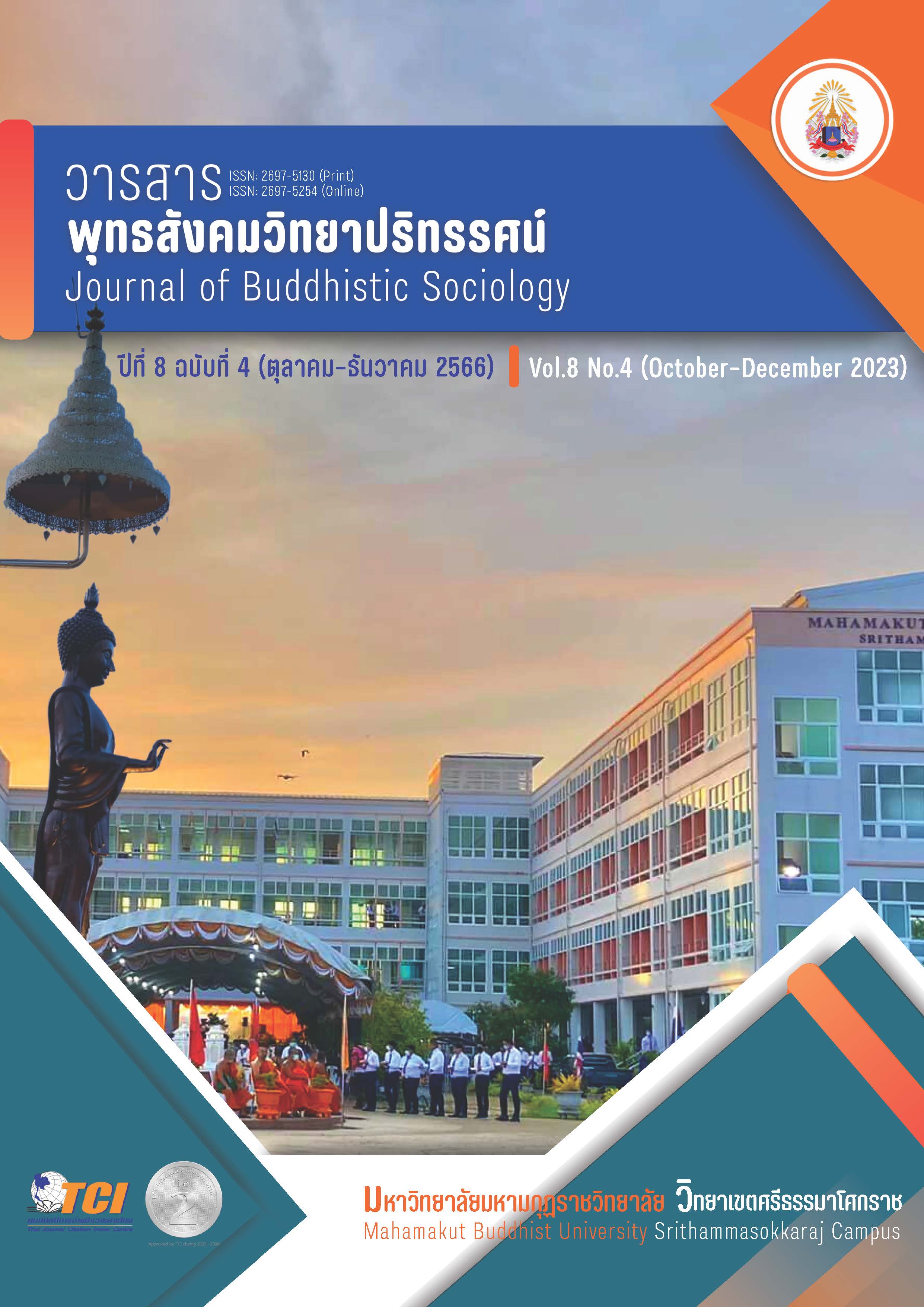AN APPLICATION OF SATI (MINDFULNESS) IN DAILY LIFE OF PEOPLE FROM VIRUS CORONA 2019 (COVID-19) EPIDEMIC IN PHOSADET SUB-DISTRICT, MUANG DISTRICT, NAKHON SI THAMMARAT PROVINCE
Main Article Content
Abstract
This thematic paper aimed to 1) study principles of applying Sati (mindfulness) in daily life due to the Coronavirus 2019 (Covid-19) pandemic of people in PhoSadet Sub-district, Mueang District, Nakhon Si Thammarat Province, and 2) present the suggestions and guidelines to promote Sati (mindfulness) application in daily life of people due to the Coronavirus 2019 (Covid-19) pandemic of people in Pho Sadet Sub-district, Mueang District, Nakhon Si Thammarat Province. It was a mixed-method research. The population was 9,941 people living in Pho Sadet Sub-district. The sample group comprised 398 people. The research tool used for data collection was closed-ended questionnaires. The statistics used for data analysis were the percentage, mean, and standard deviation. The tool used for collecting qualitative data was structured in-depth interviews used for five key informants.
The research showed that:
1. Overall, the level of applying Sati principles in people's daily lives due to the Coronavirus 2019 (COVID-19) pandemic was high. When considering each aspect arranged in descending order, the highest mean aspect was Contemplation of body (=4.05), followed by Contemplation of mind (
=4.00), Contemplation of mind-objects (
=3.93), and the lowest mean aspect was Contemplation of feelings (
=3.70), respectively.
2. Guidelines for promoting Sati application in daily life due to the Coronavirus 2019 (COVID-19) pandemic of people in the Pho Sadet Sub-district were as follows: there should be approaches to promote people to have the mindfulness of awareness for disease prevention, whether physical, mental, and emotional stability. Accurate information must be communicated. There should be a place to prevent disease, and group activities should be organized to exchange knowledge by sharing experiences occurring in life, practicing mindfulness by connecting events, and considering solving problems from events using mindfulness.
Article Details

This work is licensed under a Creative Commons Attribution-NonCommercial-NoDerivatives 4.0 International License.
References
BBC NEWS. (2563). ไวรัสโคโรนา: อนามัยโลกประกาศให้โควิด-19 เป็นการระบาดใหญ่ทั่วโลก. เรียกใช้เมื่อ 4 กันยายน 2566 จาก https://www.bbc.com/thai/international
คณะแพทยศาสตร์โรงพยาบาลรามาธิบดี. (2563). ความรู้พื้นฐานโควิด-19. เรียกใช้เมื่อ 4 กันยายน 2565 จาก http://phoubon.in.th/covid19/
เทศบาลตำบลโพธิ์เสด็จ. (2564). ข้อมูลพื้นฐาน. เรียกใช้เมื่อ 6 ธันวาคม 2566 จาก https://phosadet.go.th/content/information/1
นารีมะห์ แวปูเตะ และคณะ. (2564). พฤติกรรมการป้องกันโรคจากไวรัสโคโรนา 2019 ของนักศึกษา มหาวิทยาลัยราชภัฏสงขลา. วารสารสภาการสาธารณสุขชุมชน, 3(2), 31-39.
ปัญจวรา บุญสร้างสม. (2563). “สติ” รากฐานมั่นคงชีวิต สร้างสุขภาวะทางใจ. เรียกใช้เมื่อ 6 ธันวาคม 2566 จาก https://www.thaihealth.or.th.
อภิญญา อิงอาจ และณัฐพร กาญจนภูมิ. (2563). ความกังวลในสถานการณ์การแพร่ระบาดของโรคติดเชื้อไวรัสโคโรนา 2019 ของนักศึกษาระดับปริญญาตรี. วารสารบริหารธุรกิจเทคโนโลยีมหานคร, 17(2), 94-113.


